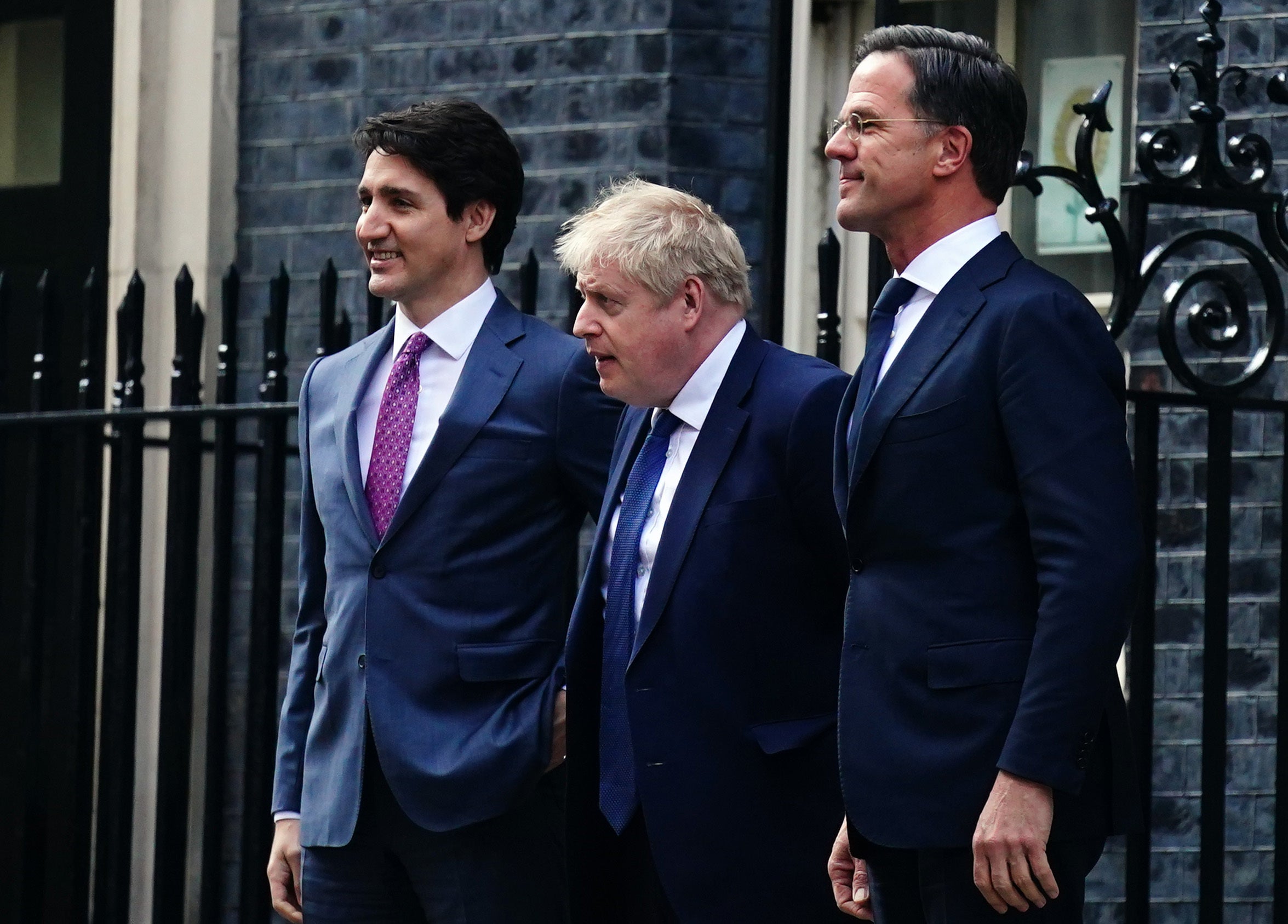Johnson calls for ‘step-by-step’ approach to banning Russian oil and gas
The PM said European countries need to secure substitute sources of energy supply if they are to tighten the squeeze on Moscow.

Your support helps us to tell the story
From reproductive rights to climate change to Big Tech, The Independent is on the ground when the story is developing. Whether it's investigating the financials of Elon Musk's pro-Trump PAC or producing our latest documentary, 'The A Word', which shines a light on the American women fighting for reproductive rights, we know how important it is to parse out the facts from the messaging.
At such a critical moment in US history, we need reporters on the ground. Your donation allows us to keep sending journalists to speak to both sides of the story.
The Independent is trusted by Americans across the entire political spectrum. And unlike many other quality news outlets, we choose not to lock Americans out of our reporting and analysis with paywalls. We believe quality journalism should be available to everyone, paid for by those who can afford it.
Your support makes all the difference.European countries need to secure substitute sources of energy supply if they are to ban Russian oil and gas imports in a further tightening of the economic squeeze on Moscow, Boris Johnson has warned.
US Secretary of State Antony Blinken said over the weekend that Washington was in “very active discussions” with European allies over energy sanctions amid calls from Ukrainian President Volodymyr Zelensky for tougher action.
His comments saw gas prices surge by more than 70% to a new all-time high, while the cost of oil reached its highest level for 14 years.
But following talks in Downing Street with the prime ministers of Canada and the Netherlands, Mr Johnson called for a “step-by-step” approach as European countries weaned themselves off Russian hydrocarbons.
In the UK, he said ministers were looking at the possibility of using more oil and gas from British sources – although he insisted this did not mean abandoning its commitment to reducing carbon emissions.
“It is completely the right thing to do to move away from dependence on Russian hydrocarbons, but we have to do it step by step,” he told a joint news conference.
“We have got to make sure we have substitute supply. One of the things we are looking at is the possibility of using more of our own hydrocarbons
“That doesn’t mean we are in any way abandoning our commitment to reducing CO2, but we have got to reflect the reality that there is a crunch on at the moment. We need to increase our self-reliance.”
Dutch premier Mark Rutte warned that if countries moved too quickly to ban Russian oil and gas, it could backfire with “enormous consequences”.
He added: “Here we should not make a mistake. We have to make sure that they don’t generate unmanageable risks to energy supply in European countries and beyond, including Ukraine.”
Earlier, Downing Street denied suggestions the Government could relax its targets for achieving net zero or lifting the moratorium on fracking in response to the crisis, but said ministers were well aware of the impact of sanctions.
“We recognise people across the country will be thinking about the effect of sanctions which is why we are doing everything we possibly can to protect them from the repercussions in terms of cost of living,” a No 10 spokesman said.
Announcing a further £175 million of UK aid for Ukraine, Mr Johnson said Kyiv’s friends needed to create “a coalition of humanitarian, economic and defensive military support” to ensure the Vladimir Putin’s catastrophic invasion failed.
“The president of Russia is plainly doubling down,” he said.
“He has decided that he is going to continue with an all-out onslaught on centres of habitation in a way that we think is utterly repugnant. It’s clear that we’re going to have to do more.”
As rockets continued to rain down on Ukrainian towns and cities, Mr Johnson indicated that they were looking at further measures targeting Russian banks and on cutting them off from the Swift of global payments system.
There was also “more to be done” on targeting individuals linked to Mr Putin’s regime, Mr Johnson said, although he stressed the need to avoid a “witch hunt” against all prominent Russians in the UK.
Canadian prime minister Justin Trudeau said his country was targeting 10 more individual Russians based on a list drawn up by jailed opposition leader Alexei Navalny.
Meanwhile ministers were pushing a new Economic Crime Bill through the Commons on Monday in a fast-track procedure to bolster its ability to target oligarchs.
The Government has faced criticism for refusing to open its borders to Ukrainians, but Mr Johnson insisted the UK would welcome those fleeing the fighting, with thousands of visa applications being processed.
The Home Office revealed that only “around 50” visas had been granted under the Ukraine Family Scheme as of 10am on Sunday, but Mr Johnson said that “thousands” of applications were being processed.
As well as the visas on offer to those with family in the UK, a humanitarian sponsorship scheme will allow people and organisations to bring Ukrainians to the UK.
Speaking earlier at RAF Northolt, the Prime Minister said: “As the situation in Ukraine deteriorates, people are going to want to see this country open our arms to people fleeing persecution, fleeing a war zone.
“I think people who have spare rooms, who want to receive people coming from Ukraine, will want us to have a system that enables them to do that. And that is already happening.”
Subscribe to Independent Premium to bookmark this article
Want to bookmark your favourite articles and stories to read or reference later? Start your Independent Premium subscription today.